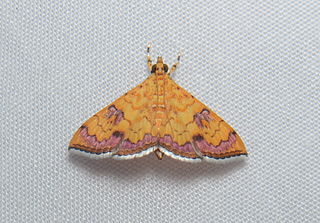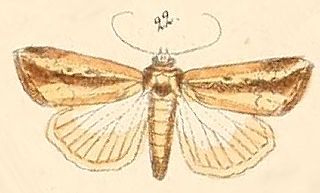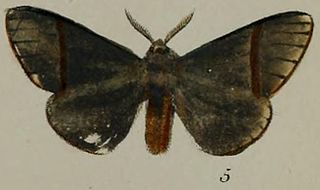
Mocis repanda, the striped grass looper, is a species of moth of the family Erebidae. It was described by Johan Christian Fabricius in 1794. It is found in Central America and the Caribbean, including Cuba, the Dominican Republic, Guadeloupe, Guatemala, Jamaica, Puerto Rico and Saint Thomas. Strays can be found in the United States, up to southern Texas as well as subtropical Africa south of the Sahara, including the islands of the Indian Ocean.
Coniostola is a genus of moths belonging to the subfamily Olethreutinae of the family Tortricidae.

Stemorrhages sericea, the large emerald pearl, is a moth of the subfamily of Spilomelinae within the family Crambidae. It lives throughout Africa south of the Sahara, and the Indian Ocean islands of Réunion, Madagascar, Mauritius and the Comoros.

Isocentris filalis is a moth of the family Crambidae described by Achille Guenée in 1854. It is found in Cameroon, Comoros, the Democratic Republic of the Congo, Réunion, Madagascar, Mauritius, Togo Indonesia (Java), Myanmar and Taiwan.

Thumatha fuscescens is a moth of the family Erebidae first described by Francis Walker in 1866. It is found in Australia, South-East Asia, India, Sri Lanka, the Comoros, Réunion, Madagascar, and Gabon.
Ozarba corniculans is a moth of the family Noctuidae. The species was first described by Hans Daniel Johan Wallengren in 1860. It is found in Kenya, Zimbabwe, South Africa and Madagascar.
Hypena polycyma is a moth of the family Erebidae first described by George Hampson in 1902. This species is known from South Africa, Kenya, Madagascar and Réunion.
Simplicia extinctalis is a litter moth of the family Erebidae. It is found in most countries of subtropical Africa, from Sierra Leone to Somalia and from Ethiopia to South Africa, including some islands of the Atlantic Ocean and Indian Ocean, as well as in Yemen.

Leucania tacuna is a species of moth of the family Noctuidae. It is found in Congo, Uganda, Kenya and South Africa.

Racotis squalida is a species of moth of the family Geometridae first described by Arthur Gardiner Butler in 1878. It is found in central, eastern and southern Africa.
Ametropalpis vidua is a moth of the family Erebidae first described by William Jacob Holland in 1894. It is found in Cameroon, Gabon, Rwanda and Uganda.

Epanaphe moloneyi is a moth in the family of Notodontidae that is found in Africa. The species was first described by Herbert Druce in 1887.

Pitthea neavei, or Neave's highflier, is a moth of the family Geometridae first described by Louis Beethoven Prout in 1915. It is found in Malawi and Congo.

Pitthea trifasciata is a moth of the family Geometridae first described by Hermann Dewitz in 1881.
Euchromia folletii, the South African day-flying moth, is a species of moth of the subfamily Arctiinae. It was described by Félix Édouard Guérin-Méneville in 1832. It is found on the Comoros and Seychelles, as well as in Ethiopia, Kenya, Madagascar, Mozambique, Senegal, Sierra Leone, South Africa and Tanzania.

Episparis penetrata is a species of moth in the family Erebidae first described by Francis Walker in 1857.

Cnaphalocrocis trebiusalis is a species of moth of the family Crambidae. It can be found from Africa to south-east Asia.

Procometis is a genus of moths in the family Autostichidae.

Eutorna is a genus of gelechioid moths.
Eretmocera scatospila is a moth of the family Scythrididae. It was described by Philipp Christoph Zeller in 1852. It is found in Botswana, Democratic Republic of Congo, Gambia, Ghana, Kenya, Namibia, Nigeria and South Africa.











